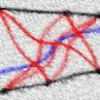 21
21The post by Arnab can be fixed (one can prove the inequality)
Nonsense in the sense Hermite's identity does absolutely nothing
:D
Here is a proof by combinatorial argument
A := \left \{t : t \; \; \; \text{is a disjoint partition of} \left \{1, \ldots , k^2 \right \} \text{with each classes containing}\; \; \; k\; \; \; \text{elements of} \left \{1, \ldots , k^2 \right \} \right \}
B := \left \{t : t \; \; \; \text{is a disjoint partition of} \left \{1, \ldots , k^3 \right \} \text{with each classes containing}\; \; \; k\; \; \; \text{elements of} \left \{1, \ldots , k^3 \right \} \right \}
Then
|A| = \frac{k^2 !}{ k ! \cdot (k!)^{k}}
|B| = \frac{k^3 !}{ k^2 ! \cdot (k!)^{k^2}}
And
|A| |B| = \frac{k^3 !}{(k!)^{k^2 + k+ 1}}
so we are done.
 21
21Let p\le k be a prime....
Proving \lfloor \frac{k^3}{p}\rfloor+\lfloor \frac{k^3}{p^2}\rfloor+\lfloor \frac{k^3}{p^3}\rfloor+\cdots\ge(k^2+k+1)\left(\lfloor \frac{k}{p}\rfloor+\lfloor \frac{k}{p^2}\rfloor+\lfloor \frac{k}{p^3}\rfloor+\cdots\right)
will be sufficient.
Hermite's Identity says that \lfloor nx\rfloor=\lfloor x+\frac1n\rfloor+\lfloor x+\frac2n\rfloor+ \lfloor x+\frac3n\rfloor+ \cdots \lfloor x+\frac{n-1}{n}\rfloor
where n is a positive integer.
Now break with the help of the idenity that:
\sum_{r=1}^{\infty}\lfloor k^2\frac{k}{p^r}\rfloor =\sum_{r=1}^{\infty}\lfloor\frac{k}{p^r}+\frac{1}{k^2}\rfloor+\cdots+\sum_{r=1}^{\infty}\lfloor\frac{k}{p^r}+\frac{1}{k}\rfloor+\sum_{r=1}^{\infty}\lfloor\frac{k}{p^r}+\frac{1}{k}+\frac{1}{k^2}\rfloor+\cdots+\sum_{r=1}^{\infty}\lfloor\frac{k}{p^r}+1-\frac{1}{k^2}\rfloor
 341
341Let v_p(N) denote the highest power of p that divides N
for p such that $p \not |\ k$ it obvious that
v_p (k^3!) = v_p((k^3-1)!)=v_p([(k-1)(k^2+k+1)]!)
\ge (k^2+k+1)v_p((k-1)!) = (k^2+k+1)v_p(k!)
The proof needs to be devised for p|k
 21
21@man111: I don't think this has an easier proof by induction.
Do you have such a proof ?
 1708
1708Thanks Arnab, Bhatt Sir and Shubhodip
No I have solved Using Induction
But Your Proof is Very easier.